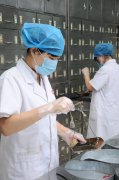Pistachios are Bad for CKD Patients
Pistachios are originated from Iraq, Iran and Syria. Pistachios are rich in vitamin E, which has the effect of anti-aging and strengthening one’s physique. But to chronic kidney disease patients, they had better not eat pistachios. Because there are many substances of pistachios that are bad to CKD patients. Such as:
1. Protein
Like many nuts, pistachios are high in protein. A 1-oz serving of dry roasted pistachios provides 6g of protein. Although protein is a necessary nutrients, chronic kidney disease patients are often suggested to limit the intake of this nutrient.
2. Potassium
Pistachios are also rich in potassium. Foods that contain high amount of this mineral are beneficial for all human beings, excepts for those who are suffering from any kind of kidney problems.
3. Phosphorus
Pistachios are rich in phosphorus, a mineral needed for building healthy bones, as well as keeping other parts of human body healthy. Normally functioning kidneys can remove excess phosphorus in the blood. When affected by renal disease, the kidneys fail to work well removing this mineral. Foods that are high in phosphorus are generally suggested to be avoided.
1. Protein
Like many nuts, pistachios are high in protein. A 1-oz serving of dry roasted pistachios provides 6g of protein. Although protein is a necessary nutrients, chronic kidney disease patients are often suggested to limit the intake of this nutrient.
2. Potassium
Pistachios are also rich in potassium. Foods that contain high amount of this mineral are beneficial for all human beings, excepts for those who are suffering from any kind of kidney problems.
3. Phosphorus
Pistachios are rich in phosphorus, a mineral needed for building healthy bones, as well as keeping other parts of human body healthy. Normally functioning kidneys can remove excess phosphorus in the blood. When affected by renal disease, the kidneys fail to work well removing this mineral. Foods that are high in phosphorus are generally suggested to be avoided.




评论
发表评论